|
|
|
Sort Order |
|
|
|
Items / Page
|
|
|
|
|
|
|
| Srl | Item |
| 1 |
ID:
140323
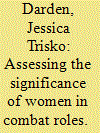

|
|
|
|
|
| Summary/Abstract |
What should we know about the roles of women in armed conflicts? I review the existing literature on women’s roles in regular and irregular conflicts to identify gaps in our understanding of the significance of female combatants. I draw on contemporary and historical cases of women’s combat participation across world regions and, in so doing, I challenge existing assumptions about the limits of women’s participation in armed conflict. Examining women as a group and expecting conflict to affect this group in predictable and easily identifiable ways only reinforces existing assumptions about women and war. To understand the range of motivations underlying women’s decisions to fight or to not fight, we should give greater attention to opportunity structures and other social conditions rather than simply assuming that women have different incentives than men.
|
|
|
|
|
|
|
|
|
|
|
|
|
|
|
|
| 2 |
ID:
190552
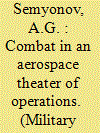

|
|
|
|
|
| Summary/Abstract |
This paper lists the general provisions for repelling aerospace aggression at the initial stage of large-scale warfare. It also gives the authors' view on the system of forms and methods of combat in an aerospace theater of operations.
|
|
|
|
|
|
|
|
|
|
|
|
|
|
|
|
| 3 |
ID:
084302
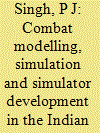

|
|
|
| 4 |
ID:
143287
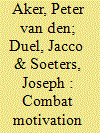

|
|
|
|
|
| Summary/Abstract |
This research note presents the findings of a survey study among veterans from the Netherlands armed forces who participated in operations since the Second World War. The aim of the study is to reveal the veterans’ experiences with respect to their combat motivation—or lack thereof—and actual participation in combat actions. The data demonstrate that over time the degree of combat motivation has increased. The data also demonstrate that those who participated in combat actions and were motivated to do so are generally positive about operational and social–psychological aspects of the organization and its surroundings. The implications of these findings are discussed.
|
|
|
|
|
|
|
|
|
|
|
|
|
|
|
|
| 5 |
ID:
047524
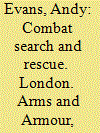

|
|
|
|
|
| Publication |
London, Arms and Armour, 1999.
|
| Description |
192p.
|
| Standard Number |
1854093398
|
|
|
|
|
|
|
|
|
|
|
|
Copies: C:1/I:0,R:0,Q:0
Circulation
| Accession# | Call# | Current Location | Status | Policy | Location |
| 043235 | 358.4/EVA 043235 | Main | On Shelf | General | |
|
|
|
|
| 6 |
ID:
098361
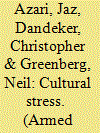

|
|
|
|
|
| Publication |
2010.
|
| Summary/Abstract |
The purpose of this article is to expand civil-military and military health research's concepts of stress with the addition of a theoretical construct of the concept known as "cultural stress." Military research often discusses combat and operational stress and its effect on soldiers but does not address unique culturally induced stressors created by the modern military's interaction with indigenous populations. Civilian research discusses stress as it relates to "culture shock" but does not account for unique pressures facing servicemen in both peacetime and wartime environments. This article synthesizes these concepts to produce a new conceptual basis of "cultural stress" from which further empirical research can be conducted.
|
|
|
|
|
|
|
|
|
|
|
|
|
|
|
|
| 7 |
ID:
170945
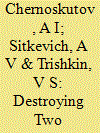

|
|
|
|
|
| Summary/Abstract |
The authors present a new method of destroying two heterogeneous groups by comparing their combat superiority coefficients. Examples demonstrate this method's efficiency and in certain cases, its application as the sole option of attaining victory
|
|
|
|
|
|
|
|
|
|
|
|
|
|
|
|
| 8 |
ID:
098747
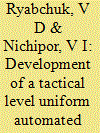

|
|
|
| 9 |
ID:
192043
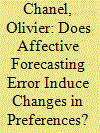

|
|
|
|
|
| Summary/Abstract |
This paper investigates how affective forecasting errors (A.F.E.s), the difference between anticipated emotion and the emotion actually experienced, may induce changes in preferences on time, risk and occupation after combat. Building on psychological theories incorporating the role of emotion in decision-making, we designed a before-and-after-mission survey for Danish soldiers deployed to Afghanistan in 2011. Our hypothesis of an effect from A.F.E.s is tested by controlling for other mechanisms that may also change preferences: immediate emotion, trauma effect – proxied by post-traumatic stress disorder (P.T.S.D.) – and changes in wealth and risk perception. At the aggregate level, results show stable preferences before and after mission. We find positive A.F.E.s for all three emotions studied (fear, anxiety and excitement), with anticipated emotions stronger than those actually experienced. We provide evidence that positive A.F.E.s regarding fear significantly increase risk tolerance and impatience, while positive A.F.E.s regarding excitement strengthen the will to stay in the military. Trauma has no impact on these preferences.
|
|
|
|
|
|
|
|
|
|
|
|
|
|
|
|
| 10 |
ID:
160624
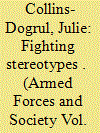

|
|
|
|
|
| Summary/Abstract |
This study examines reader responses to opinion editorials about women in combat and contributes to the literature on women in the military by explaining how contests over sex–gender essentialism and diversity underlie public debates about individual rights and military effectiveness. Comments in favor of women’s ground combat exclusion use a logic of averages to promote essentialist thinking about men and women. They categorize women as inferior soldiers and argue that desegregation puts individual soldiers and the nation at risk. Conversely, comments in favor of integration advance a view of sex–gender diversity that places men and women along a continuum with overlapping qualities, suggesting further that giving exceptional women the freedom to serve in ground combat will advance both equality and military readiness. We argue that public commentary about women in combat concerns more than the military, underlying this discourse are distinct conceptions and expectations of men and women.
|
|
|
|
|
|
|
|
|
|
|
|
|
|
|
|
| 11 |
ID:
130752
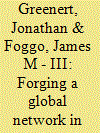

|
|
|
|
|
| Publication |
2014.
|
| Summary/Abstract |
As the world becomes more complex and the oceans less secure, we are compelled to strengthen the bonds of international maritime cooperation.
The United States of America maintains the largest maritime force in the world. The U.S. Navy is uniquely postured to operate forward and be ready to respond to any threat globally. This enables us to have naval forces present where it matters and when it matters. Throughout history, however, we have learned that it is almost always in the best interest of nations to act together when responding to crises, whether it involves deterrence or combat or providing humanitarian support. Accordingly, the U.S. Navy has rarely operated alone in a crisis. One of our advantages, as a nation and as a Navy, has been our extensive network of alliances, partnerships, and coalitions.
|
|
|
|
|
|
|
|
|
|
|
|
|
|
|
|
| 12 |
ID:
031532
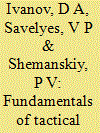

|
|
|
|
|
| Publication |
Washington, D C, United States Air Force, 1977.
|
| Description |
ix, 333p.,figure
|
|
|
|
|
|
|
|
|
|
|
|
Copies: C:1/I:0,R:0,Q:0
Circulation
| Accession# | Call# | Current Location | Status | Policy | Location |
| 024579 | 355.42/IVA 024579 | Main | On Shelf | General | |
|
|
|
|
| 13 |
ID:
186817
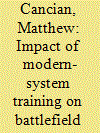

|
|
|
|
|
| Summary/Abstract |
What drives soldiers to risk death on the battlefield? Scholars have suggested that battlefield participation is driven by ideology, coercion, and cohesion while overlooking the importance of confidence in tactical success. On contemporary battlefields, training in effective, modern-system tactics will increase initial confidence and create a positive feedback loop of battlefield participation and combat effectiveness. I test this theory through the as-if random assignment of Peshmerga (Kurdish soldiers) to modern-system training by Western countries. One third of the Peshmerga had no formal training, one third had non–modern-system training from other Peshmerga, and one third had been trained in the modern-system. While non–modern-system training slightly increased unit confidence, it did not impact battlefield participation; coalition training in modern-system tactics dramatically increased confidence and, more importantly, led to higher levels of self-reported battlefield participation
|
|
|
|
|
|
|
|
|
|
|
|
|
|
|
|
| 14 |
ID:
116115
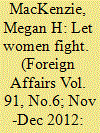

|
|
|
|
|
| Publication |
2012.
|
| Summary/Abstract |
On Wednesday, the U.S. Department of Defense announced that it would lift the ban on women in combat. This landmark decision reverses the 1994 "direct ground combat rule," which held that "women shall be excluded from assignment to units below the brigade level whose primary mission is to engage in direct combat on the ground."
|
|
|
|
|
|
|
|
|
|
|
|
|
|
|
|
| 15 |
ID:
081014
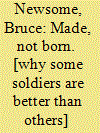

|
|
|
|
|
| Publication |
Westport, Praeger Security International, 2007.
|
| Description |
210p.
|
| Standard Number |
9780275998301
|
|
|
|
|
|
|
|
|
|
|
|
Copies: C:1/I:0,R:0,Q:0
Circulation
| Accession# | Call# | Current Location | Status | Policy | Location |
| 053165 | 355.33/NEW 053165 | Main | On Shelf | General | |
|
|
|
|
| 16 |
ID:
024493
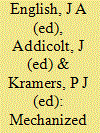

|
|
|
|
|
| Publication |
Washington, Pergamon Brassey's International Defense Publishers, 1985.
|
| Description |
xiv, 188p.
|
| Standard Number |
0080254055
|
|
|
|
|
|
|
|
|
|
|
|
Copies: C:1/I:0,R:0,Q:0
Circulation
| Accession# | Call# | Current Location | Status | Policy | Location |
| 026636 | 355.42/ENG 026636 | Main | On Shelf | General | |
|
|
|
|
| 17 |
ID:
024498
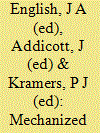

|
|
|
|
|
| Publication |
Washington, Pergamon-Brassey's International Defence publishers, 1985.
|
| Description |
xiv, 188p.
|
| Standard Number |
0080254055
|
|
|
|
|
|
|
|
|
|
|
|
Copies: C:1/I:0,R:0,Q:0
Circulation
| Accession# | Call# | Current Location | Status | Policy | Location |
| 026202 | 355.42/ENG 026202 | Main | On Shelf | General | |
|
|
|
|
| 18 |
ID:
090486
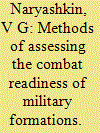

|
|
|
| 19 |
ID:
098010
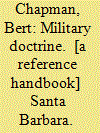

|
|
|
|
|
| Publication |
Santa Barbara, Praeger Security International, 2009.
|
| Description |
ix, 197p.
|
| Standard Number |
9780313352331, hbk
|
|
|
|
|
|
|
|
|
|
|
|
Copies: C:1/I:0,R:0,Q:0
Circulation
| Accession# | Call# | Current Location | Status | Policy | Location |
| 055143 | 355.033073/CHA 055143 | Main | On Shelf | General | |
|
|
|
|
| 20 |
ID:
146907
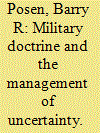

|
|
|
|
|
| Summary/Abstract |
Organization theorists have long argued that the management of uncertainty is a major motive of organizational behavior. Military organizations must deal with very high levels of uncertainty. Some uncertainty comes from the international political environment that gives the Military organizations life; some arises from the possibility of direct intervention by formal authorities upon whom the organization depends for critical resources; some emerges from the mixed motives of organizational participants; some arises from the fact that Military organizations do not get much realistic practice; and some arises from the very nature of combat. Doctrine is one of the many ways that militaries address these uncertainties. But doctrine writers make tradeoffs among these problems, tradeoffs that are themselves reflective of the politics of the moment.
|
|
|
|
|
|
|
|
|
|
|
|
|
|
|
|
|
|
|
|
|